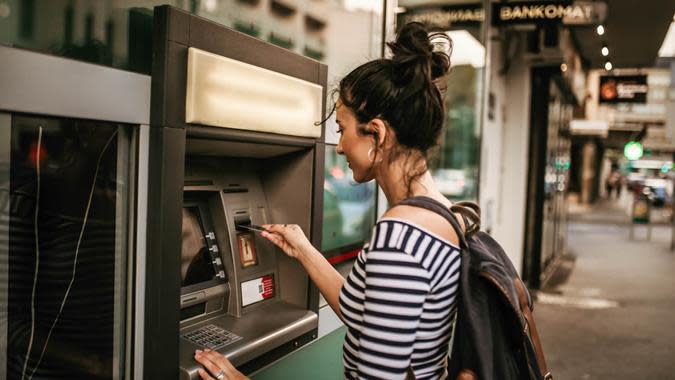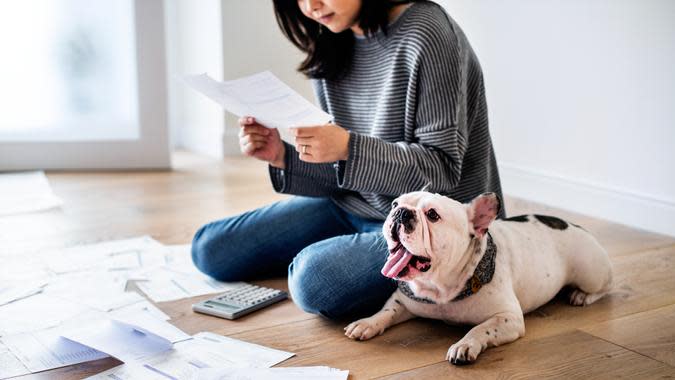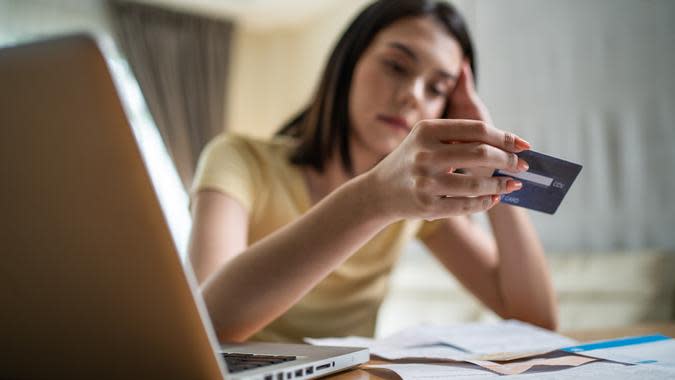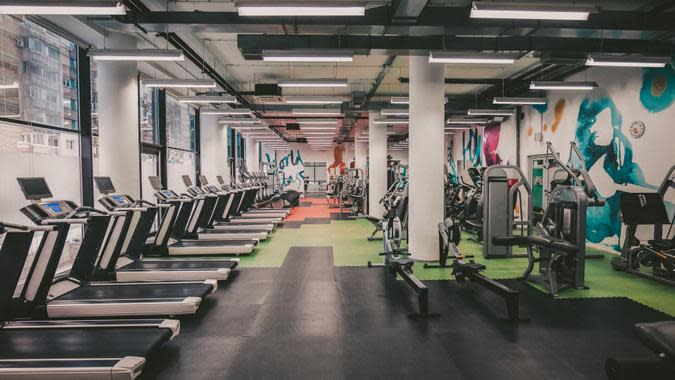Cutting These 13 Habits Could Save You $15K Monthly

You shop discount sales, make decent wages and have swapped a few brand names for generic -- but your bank accounts still aren't where you'd like them to be.
Discover: 7 Frugal Habits That Aren't Actually Good for Your Finances
Find Out: How to Get Cash Back on Your Everyday Purchases
If this sounds familiar -- or you'd simply like to have more funds stashed away for a rainy day -- consider adding better financial habits to your goals for 2023.
Improving your economic well-being can be just as important as boosting your physical health. And, it'll allow you to take care of any other needs more easily. Click through to see which bad habits to get rid of next year.

Using Out-of-Network ATMs
Withdrawing cash from any old ATM can seem worthwhile for the convenience, but it could also cost you a lot in the long run.
Find Out: 4 Red Flags as You Check Your Bank Statements Every Month
Dave Ramsey: 'Money Is Not Just Math, It's Behavior' -- 5 Bad Habits To Break Today
It breaks down like this: a bank usually charges ATM users outside of its network a fee. The average bank fee associated with using an out-of-network ATM runs an average of $2.83, according to a recent GOBankingRates study.
Add to that the charge to use another Bank's ATM, which can cost between $1.50 and $3.50, and you could end up shelling out an additional $5 (or more). Non-bank ATMs often have higher charges for using their machines.
Instead of dreading these costs whenever you need cash, try moving your checking account to a bank that refunds you for ATM fees.

Not Checking Your Bank Statement
If you don't comb over your bank statements regularly, you're likely to be less mindful of how much money you're spending. And less mindfulness can easily lead to less saving and more spending.
You could also miss discrepancies, such as charges for items or services you never purchased. Over time, even small erroneous charges can really add up and facilitate unnoticed hacking. Many thieves start by taking tiny amounts to see if the account owner notices before stealing more.
I'm a Financial Planning Expert: Here Are 5 Things You Should Never Spend Money on If You Want To Be Rich

Buying Coffee Every Day
If you've got to have your java, preparing it at your home or office instead of buying daily lattes could save you big time.
The average Starbucks drink comes out to about $2.75 per cup. Add whipped cream or sub almond milk for dairy, and it's pricier. If you stopped your daily Starbucks habit for 30 days and reserved the barista coffee for only occasional treats instead, you could save over $80 each month.

Not Having a Budget
A 2021 survey conducted by PennyHoarder revealed that over half of Americans (55%) don't use a budget to manage their money.
And as some business gurus assert, when you fail to plan, you plan to fail. You can't stick to a budget that doesn't exist. Budget specifics vary, but even modest efforts such as designating a monthly limit for food or recreation can go far.
If this seems grueling, shift your mindset toward creativity. If you overspend on entertainment, for example, find fun, affordable alternatives. Swap fine-dining for picnics, research free museum days and choose matinees or Netflix over evening films.

Putting Everything on Credit (and Not Paying It Off)
Credit cards can bring major perks over debit cards, from changes for an improved credit score to an easier time having stolen card issues remedied. But using credit cards to fund everything can fuel huge financial burdens.
According to the most recent TransUnion report, Americans have an average credit card debt of $5,733. This is up 14.4% from the same time last year.
Unless you pay your credit cards off every month, you run the risk of hefty, accrued interest. To maintain a good credit score, avoid spending more than 30% of your available limit.
Read: Check Your $2 Bills -- They Could Be Worth Upwards of $4,500

Only Paying Credit Card Minimums
Another sure way to increase debt and money stress is to pay only the minimum required amount toward your credit card debt each month. Most cards only require cardholders to pay up to 3% of the monthly balance.
Not only does paying that small amount leave you with more to pay later, but you'll accrue interest. Interest rates vary by card but average over 21.04% nationally in 2023.

Seldom Dining In
Eating out is one of the most expensive habits to break.
Researcher Eddie Yoon reported in the Harvard Business Review that after two decades of analysis, he found that only 10% of Americans love cooking.
The other 90%? Half of them say they hate to cook, and the other half are just lukewarm. Rekindling some level of culinary enjoyment is a powerful way to feed your pocketbook.
You could spend upwards of $30 for a nice meal out, but a homemade dinner can easily cost only a few dollars or less per plate.

Smoking Daily
Smokefree.org reported that someone with a pack-a-day habit spends an average of $266 a week on cigarettes, or over $13,800 each year. That's a lot of money going up in (literal) smoke. Not to mention the cost of healthcare from smoking-relating illnesses and health conditions.
Save money and your wellness by cutting back on the smokes or, ideally, quitting altogether. Find a method that works best for you, whether that's cold-turkey quitting, behavioral therapy, nicotine patches or gum, or medication.
Try Out: 6 Steps To Take To Become a Millionaire by 30

Driving Everywhere Solo
Driving everywhere might be convenient, but it's not cheap. Americans spend an estimated 18 cents a mile for regular unleaded gas, making the annual cost of gas alone in the ballpark of $2,700.
Families that use public transportation can shrink household expenses by $10,728 a year, or $894 a month, according to a 2022 study by AAA.
Other smart money-saving habits include biking, walking or carpooling to get around more often.

Paying for Unused Services
It's easy to forget about those modest automatic charges for the gym, website subscriptions or an on-demand TV service you don't use. Health clubs, in particular, are known to sell a lot more memberships than go to use. With gym memberships averaging $40-$60 per month, this can really add up.
Go over your monthly bank statements, taking note of fees for unused services and canceling them pronto. In doing so, you might also catch services you canceled but continue to pay for.

Frequent Drinking
If you're wondering how to save money fast, you might want to slow your alcohol intake down. When dining out, it's not uncommon to spend as much on alcohol as you do on food.
To save money, stick to moderate alcohol intake -- or up to one to two servings per day -- which is also better for your health. When dining out, consider having an after-dinner drink at home afterward rather than at the restaurant.
Jaspreet Singh on the 75/15/10 Rule: This Is How the 1% Manage Their Wealth

Not Shopping Around for the Best Deals
Ever notice that the sweet discount you enjoyed at the start of your cable or internet service increased incrementally, far more than you'd anticipated? Reading the small print on contracts and researching the best prices takes time, but it's often worth it.
In 2022, Americans spent an average of $217.42 per month on cable TV according to USNews -- an all-time high that's been steadily increasing. More than 800,00 people bowed out of their package by quarter two, mostly due to spiked pricing.
Save money by switching services or even mediums, such as watching TV through the internet versus cable.

Not Investing
Investing in stocks, bonds and mutual funds might seem like Latin to you if you're not well-versed in finances, or unrealistic if you have a fair amount of debt. But even investing modestly -- which isn't as complicated as you might think -- can help you get out of debt while cushioning your savings.
If you invested $100 per month for 40 years, you have an estimated $600,000 in your portfolio. Do so for 10 years, and you'd have an estimated $150,000, which is a whole lot more than zero.
August McLaughlin contributed to the reporting for this article.
More From GOBankingRates
This article originally appeared on GOBankingRates.com: Cutting These 13 Habits Could Save You $15K Monthly

 Yahoo Finance
Yahoo Finance 